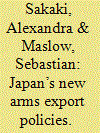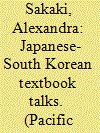|
|
|
Sort Order |
|
|
|
Items / Page
|
|
|
|
|
|
|
| Srl | Item |
| 1 |
ID:
167169


|
|
|
|
|
| Summary/Abstract |
The Belt and Road Initiative (BRI), formerly known as One Belt One Road (OBOR), has emerged as one of the top priorities for Chinese President Xi Jinping ever since he unveiled the initiative in 2013. This special issue surveys the reception of BRI in East Asia. As China’s immediate neighborhood, this region will play an important role in determining whether Beijing’s signature project will succeed in the mid- to long term. However, research has thus far mostly focused on BRI’s reception in Central Asia and (Eastern) Europe. In this introduction, we first provide an overview of the literature by identifying three main strands of interpretation on BRI, namely those focusing on geoeconomics, on geopolitics, and on international norms as well as order. Next, we provide a review of the contemporary research on both Southeast Asian and Northeast Asian perceptions of and policy responses to BRI. Finally, we discuss research gaps in the literature and provide an overview of case studies and findings in this special issue. We conclude by identifying recurring themes and characteristics in East Asian responses to BRI.
|
|
|
|
|
|
|
|
|
|
|
|
|
|
|
|
| 2 |
ID:
175660


|
|
|
|
|
| Summary/Abstract |
This article examines the significance of the changes in Japan’s arms export policy following Prime Minister Abe Shinzō’s return to power in 2012—a topic which has so far received insufficient scholarly attention. Established in the 1960s and 1970s, Japan’s ‘virtual’ ban on arms exports was an expression of the country’s postwar anti-militarism. Yet, in keeping with Japan’s increasingly active role in security affairs, Abe lifted the ban on weapons exports in 2014. Within the Ministry of Defense, a new agency was installed to oversee the arms industry and to promote military-related research and weapons transfers. We show that the Abe administration conceives of arms exports and related cooperation as an integral part of its national security strategy. Tokyo not only hopes to improve the competitiveness of its own defence industry, but also seeks to cement existing and new security partnerships while contributing to regional capacity building as a hedge against a rising China. The actual ramifications of this policy change are far from clear yet, however. A major constraint for policymaking is the reluctance of the defence sector to embrace arms export due to the associated business risks including the fear of tarnishing their corporate image.
|
|
|
|
|
|
|
|
|
|
|
|
|
|
|
|
| 3 |
ID:
119041


|
|
|
|
|
| Publication |
2012.
|
| Summary/Abstract |
One of the most notorious issues haunting Japanese-South Korean relations is the controversy over textbook depictions of Japan's colonial rule and war atrocities in the early twentieth century. In recent years, a number of bilateral projects have been launched on both the non-governmental and governmental level, seeking to narrow divergences in historical perceptions. Focusing on the Japanese side, this article assesses the impact of recent non-governmental textbook projects, arguing that these projects-while important and encouraging-have a limited capacity to prompt changes in educational policies. Textbook talks officially endorsed by the government and supported by a critical mass of politicians remain indispensable to promote a transnational reconstruction of the past. Based on a comparison between Japanese-South Korean and German-Polish government-backed talks, the paper identifies how decision makers can help foster an atmosphere conducive to the work of bilateral textbook commissions. It concludes that a key requirement for successful talks is that politicians, utilizing a variety of measures, pursue the dual goal of demonstrating high-level commitment to the talks and shielding the work proactively from nationalistic pressures. In contrast to their German counterparts, Japanese political elites have so far failed to pursue such an environment, casting doubts about progress in the textbook dispute for the foreseeable future.
|
|
|
|
|
|
|
|
|
|
|
|
|
|
|
|
|
|
|
|
|